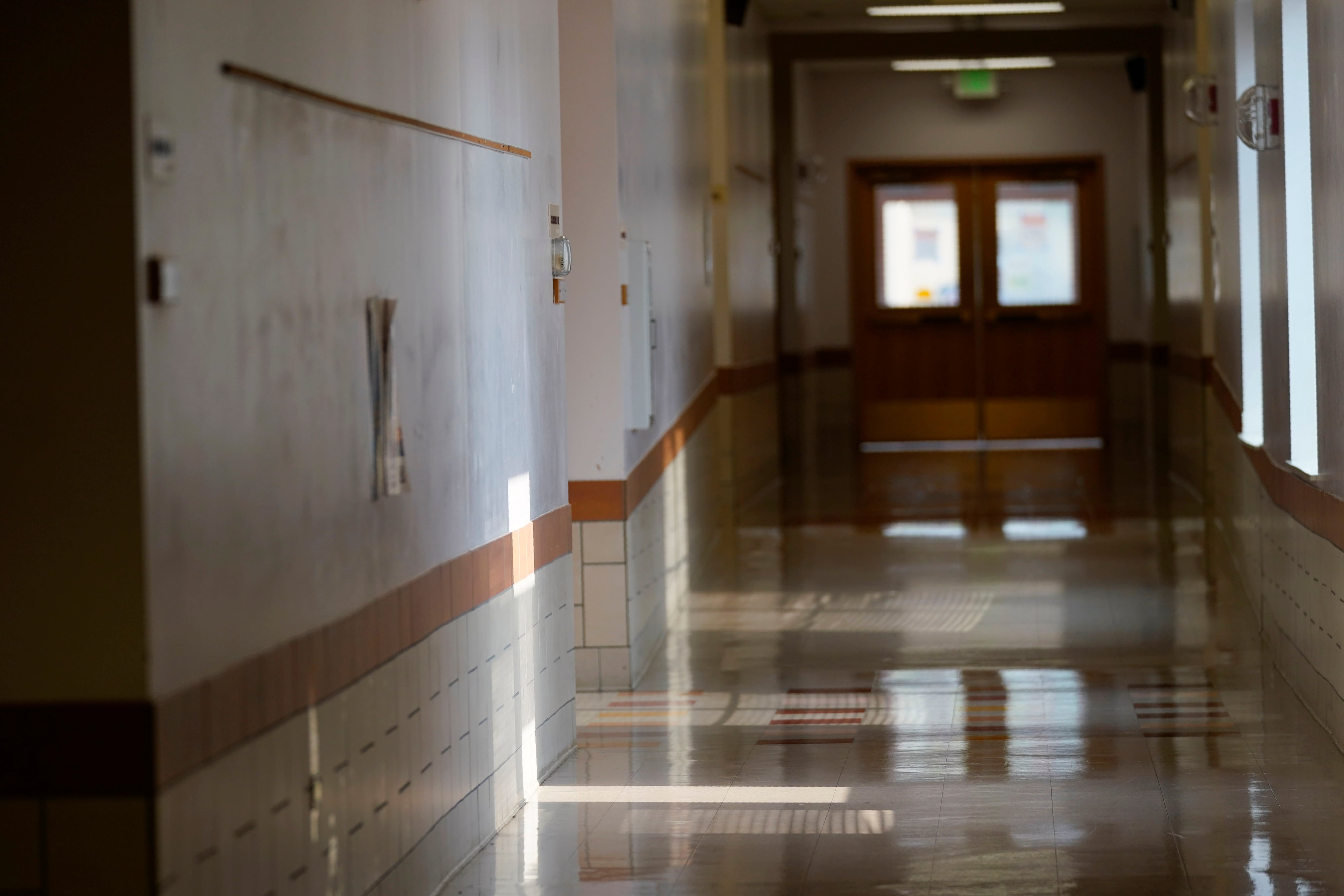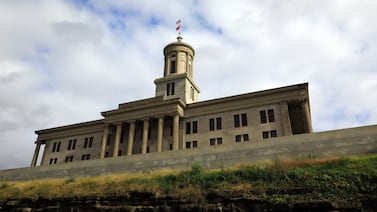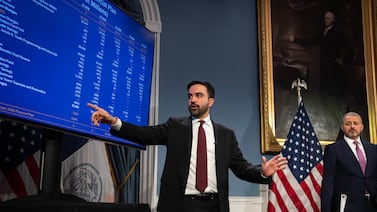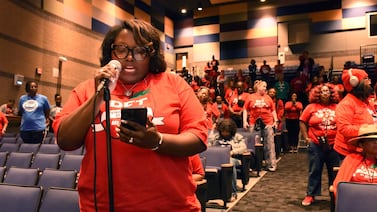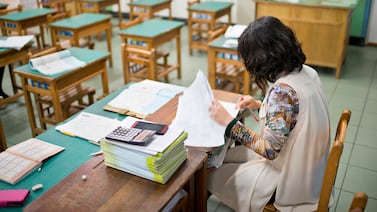Sign up for Chalkbeat Colorado’s free daily newsletter to get the latest reporting from us, plus curated news from other Colorado outlets, delivered to your inbox.
Calling the practice inhumane, unethical, and akin to solitary confinement, opponents of secluding children alone in separate rooms in response to their behavior testified for hours Wednesday in support of a bill to ban the practice in Colorado schools.
The most emotional testimony came from mothers who said their children with disabilities had been secluded. Teresa Vargas recalled walking into her son’s school to see the then-fifth-grader shut in an office, holding a stuffed sloth that he brought to school every day up to the window.
As school administrators stood outside with clipboards, her son was crying “and asking, ‘Can I get out?’” Vargas said. Her son was in the room because he’d thrown the stuffed sloth, she said.
Christie Nichol said she didn’t realize her young son had been secluded for hours a day in what his elementary school called “the quiet room,” until she attended an art show at the school. When her son and a friend from his special education classroom showed her the room, Nichol said the boys had coined their own name for it: “the torture room.”
Other parents spoke about how their children soiled themselves inside seclusion rooms because they were so scared. Parents testified that even years later, their kids had nightmares and PTSD from being shut alone in rooms with innocuous sounding names like “the opportunity room” and “the relaxation room.” In one case, an advocate said a teacher referred to a bare seclusion room as “Australia,” alluding to a country with roots as a penal colony.
“For far too long, these rooms have served as symbols of fear and isolation,” bill sponsor Rep. Regina English, a Colorado Springs Democrat, said at the hearing Wednesday, “places where the voices of our most vulnerable students are silenced and their dignity stripped away.”
House Bill 1167, of which English is the sole sponsor, would require the State Board of Education to make rules banning seclusion by Nov. 1.
The bill would also give the State Board until July 1, 2025, to create a resource bank of materials “regarding appropriate alternatives to seclusion and restraint to assist school personnel with appropriate responses to behaviors.”
Although the House Education Committee heard testimony Wednesday, English asked to delay a vote on whether to move the bill forward. English said in an interview that she wants more time to work on amendments aimed at increasing the chances that the bill will pass.
Bill spurred by case at Denver’s McAuliffe International School
Colorado schools are currently allowed to put students in seclusion rooms with the door closed. Students must be monitored through a window or video camera. Seclusion rooms must be “free of injurious items” and cannot be otherwise used for storage, custodial, or office space.
Students are often placed into seclusion because of their behavior, and available data shows young students with disabilities are disproportionately secluded.
The use of seclusion has long been controversial, but it came under greater scrutiny last year when allegations surfaced about the use of seclusion rooms at a large and popular Denver middle school, McAuliffe International School. A subsequent investigation by Denver Public Schools found that McAuliffe staff placed students in seclusion without proper supervision.
English said the McAuliffe case spurred her to introduce a bill to ban seclusion. Former DPS school board member Auon’tai Anderson testified in favor of the bill Wednesday, describing the seclusion room at McAuliffe as a hidden room the size of a storage unit with locks on the window and door, and holes punched in the drywall by the students shut inside.
“It was very triggering, because it reminded me of a prison,” Anderson said in response to questions from state lawmakers. “I’ve never seen anything like it.”
A 2020 Chalkbeat investigation uncovered weak state oversight of seclusion, and Colorado lawmakers in 2022 passed new limits and reporting requirements. But the new requirements don’t go into effect until June, leaving lawmakers and others with little data — and conflicting opinions from parents and school officials — about how widespread the practice is.
Administrators argue for keeping seclusion option as a ‘last resort’
Most of the testimony on Wednesday was from parents, advocates, and local school board members who supported the bill. But a handful of school district and special education administrators testified that they’d like to see changes to the proposal.
The administrators described seclusion as a “last resort,” but said it is sometimes necessary.
Amy Lloyd, the director of special programs for Harrison School District 2 in Colorado Springs, described a young girl who would disrobe and urinate and defecate on the floor.
When the girl began to take off her clothes, school staff would take her to another room, standing outside if she was throwing feces, Lloyd said. When the girl calmed down, which Lloyd said usually took 12 minutes, the staff would help the girl clean up and return to class.
Moira Coogan, a longtime Denver principal, said she’d worked with nonverbal students with autism who would try to run out of the school and toward the nearest body of water. Because seclusion is defined in Colorado law as putting a student in a room alone and blocking their egress, Coogan said she and other principals worry that banning seclusion would also prevent school staff from stopping a student from running out of the school.
“We do have instances where the behaviors are frightening and are at a place where we have to protect the student, sometimes from their own behaviors,” Coogan said.
Lloyd described the seclusion rooms in her district as small, unlocked classrooms with rubberized walls and floors to prevent students from injuring themselves. She said some rooms have comfortable bean bag chairs and sensory items to help students calm down.
But parents and advocates painted a different picture of seclusion rooms they’d seen that were the size of closets, with scratch marks running down the walls. In contrast to the 12-minute seclusion Lloyd described, parents and advocates told stories of children secluded all day, every day. One mother said the school moved her daughter’s desk into the seclusion room.
Denver school board member Michelle Quattlebaum said some students at McAuliffe International School went straight from the school bus to the seclusion room, which staff members referred to by the names of the students who used it: “‘Oh, that’s such-and-such’s room.’” Quattlebaum said school staff explained to the district that they were trying to “get ahead” of the students’ behavior “so everyone else can have a good day.”
“Colorado is better than this,” Darlene Derbigny, a school board member in East Otero School District RE-1 in La Junta, said during the hearing. “We need to do better.”
If the bill passes, Colorado would join a handful of other states that have banned seclusion, including Florida, Georgia, and Hawaii.
Melanie Asmar is the bureau chief for Chalkbeat Colorado. Contact Melanie at masmar@chalkbeat.org.

